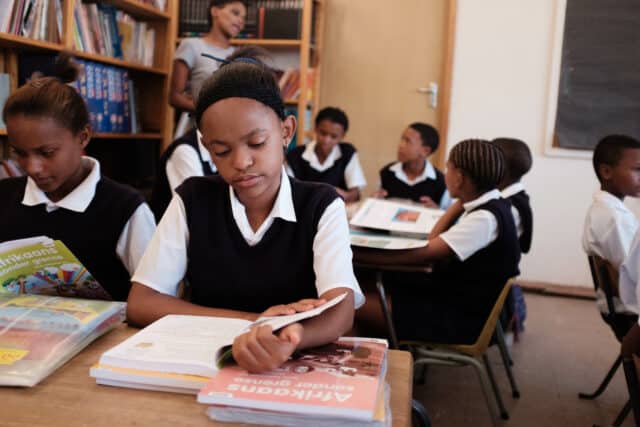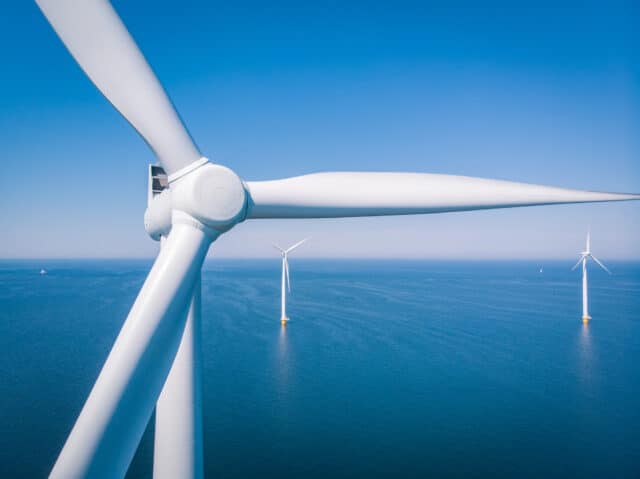View from the Top: Mary Quaney talks to Energy Focus magazine
Category
News
Date
24 February 2020
Location
Global
Mainstream’s Chief Financial Officer, Mary Quaney, has set out the role the company will play in the future of wind and solar energy in the new issue of Energy Focus.
Mary is one of the first renewable energy figures to feature so prominently in the respected Energy Industries Council journal.
And her View from the Top interview not only covers our achievements as a global leader in clean energy development, but also looks at why the world’s transition from fossil fuels has now become an unstoppable force.
Energy Focus: Today, Mainstream’s main focus is in emerging markets. Can you tell us more about the drivers behind this strategy?
Mary Quaney: We were established in 2008 with a clear mission to lead, and importantly, to accelerate the global transition from fossil fuels to renewable energy. As each year goes by, the drivers underpinning our mission have become more numerous and more pressing. Renewable energy brings four core deliverables that no other form of energy can match: low cost, scale, speed of deployment and zero emissions. And that’s why twice as much was invested in renewable generation in 2018 than was invested in coal, gas, oil and nuclear combined.
EF: What key factors contributed to the successful signing of power purchase agreements (PPAs) for renewable energy projects across Africa and Latin America?
MQ: We’ve been very successful, particularly in Chile and South Africa, where we have secured 2.5GW of PPAs through competitive tenders. In Chile we outcompeted even existing fossil fuel plant, proving how competitive renewables are now. We have an extensive development pipeline of high-quality projects in these markets.
But the key success factor is our specialist know-how. We are the only pure-play renewable energy company with a global footprint – and that gives us a breadth and depth of knowledge that I believe is unique to Mainstream. Our team has more than 1,100 years of sector experience – no other company knows renewables like we do. This industry foresight means we’re always a step ahead.
EF: Can you tell us more about securing the US$580m wind and solar debt financing deal in Chile?
MQ: The key thing about our recent US$580m funding in Chile is that it is very much part of the solution to help the government lower the cost of electricity generation in the country. Our 1.3GW wind and solar Andes Renovables platform is providing some of Chile’s cheapest power ever, directly benefitting the consumer. We closed this deal with a consortium of seven banks and we look forward to closing a second, bigger transaction in the coming months.
EF: Having recently opened your APAC HQ in Singapore, can you talk about the pipeline of projects Mainstream has in Vietnam and the region?
MQ: The APAC region is where we see the greatest growth and scale of opportunities for Mainstream during the coming two to three years. We have been there for about four years now – building a very experienced local team, expanding our development pipeline and gaining in-depth knowledge of the diverse markets in the region.
Our 800MW Soc Trang offshore wind farm is set to become the largest in South East Asia and we are at the advanced development stage, gearing up for construction. We are developing some exciting projects in the Philippines and, having spent time analysing a number of markets in the region, we are set to explore new territories in 2020.
EF: What would you say were the major renewable energy bottlenecks right now, and how can they be overcome?
MQ: The global transition to renewable energy has reached a number of major tipping points during the past few years. Renewable energy is now the clear winner globally, but the key bottleneck is political will. The world has been built on fossil fuels – but it has come at the expense of the environment. To accelerate the transition, we need to see a step change in political will; we need to see stronger policy, clearer renewable energy regulations and more long-term clarity and consistency to attract investment and scale.
EF: How important has the rise of PPAs been in facilitating the global transition to clean energy?
MQ: Private PPAs have an important role to play in the transition to renewables, and up until now they have mostly been popular in more mature markets. Moving forward, I expect we will see growth in emerging markets, where large manufacturers of global brands are demanding renewable energy in response to environmental, social and governance pressures on their supply chain. Current trends suggest that we will see more global framework PPAs with these big brands.
EF: Getting the financials right will be key to securing Europe’s 450GW target of offshore wind capacity by 2050. How will this be achieved?
MQ: Offshore wind has a crucial role to play in the decarbonisation of Europe, and indeed the world. However, making the step from tens of GWs to hundreds of GWs is going to require a much more co-ordinated approach than has been the case up until now. Investment on this scale will require transparency and long-term certainty.
Investors will require certainty of revenue streams at a greater scale than what is available today, which in turn will facilitate the deployment of greater levels of project finance. Additionally, the planning systems will need to become much more efficient and transparent in order to reduce delays and ensure more projects can get through the system and into construction and operation.
EF: Which markets are you currently looking at, in terms of expansion?
MQ: Offshore wind provides the scale that no other form of renewable energy can provide. That’s why it has such a critical role to play in the global transition, and why more and more countries are starting to see its importance.
Mainstream is a global leader in the offshore wind sector, having developed more than 30% of the UK’s 2020 offshore wind generation capacity – including the Hornsea array, the world’s largest offshore wind farm, which is currently being built in UK waters. Offshore wind is now becoming a phenomenon, and that’s reflected in our geographical spread.
We are at the advanced development stages for our 800MW Soc Trang offshore project in Vietnam. We signed an agreement last year with Eni and together are now preparing for UK Round 4 bidding. We are also preparing for Scotwind, and we’re looking at opportunities in markets such as North America and a number of Asian markets.
MQ: Attracting young people into the industry isn’t a challenge for us; the younger generation is informed and passionate about sustainability, and is attracted to companies such as Mainstream that have a strong mission to lead the energy transition. Where the industry does need to improve is in the area of gender equality, and this is something I am personally involved in in my role as a Mentor on the GWEC Women in Wind programme.
At Mainstream, we have just launched our Diversity and Inclusion programme, which is particularly focused on creating better gender balance. As an organisation we have targeted areas where there is room for improvement, particularly at more senior levels. We need more female role models in our industry, more targeted programmes and initiatives to effect change. Every organisation in the sector has a responsibility to do its piece.
EF: Going forward, what role do you see Mainstream playing in the future development of wind and solar energy?
MQ: Mainstream is entering a high growth phase globally, with 1.5GW currently in construction across Senegal, Egypt, Chile and South Africa – increasing to 2.2GW in the coming months. We are focused on rapidly expanding our 9GW development pipeline by moving into a number of new markets in 2020, and we expect to start delivering projects shortly in Australia and Colombia, where we set up development offices there in 2019.
The fundamental drivers are becoming stronger, and the sense of urgency to decarbonise global electricity systems is becoming more pressing. As we enter this new decade, I think this is going to be the decade that renewables truly come into their own – and Mainstream is well on its way to becoming a leader in the new breed of renewable energy majors.
- This interview appears in the February 2020 issue of Energy Focus and is reprinted courtesy of the Energy Industries Council. Read the full magazine, which includes a special report on Paris Agreement carbon trading proposals and an article by Scottish Energy Minister Paul Wheelhouse on Scotland’s clean energy revolution, here: http://bit.ly/2vMHzIG



